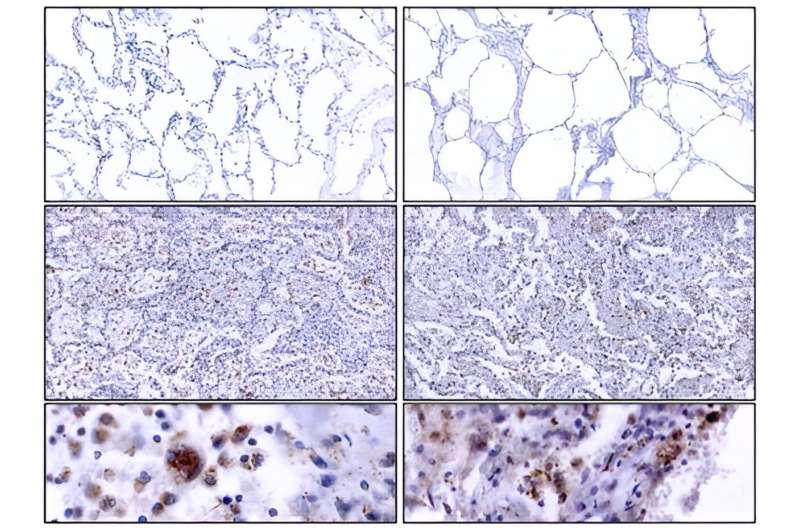This article has been reviewed according to Science X's editorial process and policies. Editors have highlighted the following attributes while ensuring the content's credibility:
fact-checked
peer-reviewed publication
trusted source
proofread
COVID-19 causes epigenetic lung scars, researchers report

COVID-19 became an international pandemic in 2020. To date, more than 770 million people have suffered from the disease and nearly 7 million of them have lost their life. The most common cause of death in the studied group is lung involvement with consequent respiratory failure. However, the targets of the virus in the lung and the mechanisms by which lung tissue can cease to be functional in the disease are largely unknown.
In an article published in the journal Chest by the group of Dr. Manel Esteller, Director of the Josep Carreras Leukemia Research Institute (IJC), ICREA Research Professor and Professor of Genetics at the University of Barcelona, the researchers report that COVID-19 caused profound epigenetic changes in the lungs of patients who died from the disease. Such alterations particularly affected genes related to hyperinflammation and fibrosis.
For the study, they analyzed an extensive collection of lung autopsy samples from patients who died from COVID-19 and compared them with healthy lungs from people who died from other unrelated diseases. Comparison of the DNA between both groups showed epigenetic differences in more than 2,000 regulation points of the genetic material.
A detailed analysis revealed that they were genetic sequences mainly associated with promoting a state of hyperinflammation, such as the overproduction of interferons and chemokines, chemical signals used by the immune system to promote inflammation.
Epigenetics is the control layer a cell uses to finely tune whether a gene will be active or not, without modifying its genetic information. Alterations in the epigenetic program of a cell can make it behave way different than expected, with organic consequences like the ones seen in the study. The research, led by the IJC, involved also researchers from Lund University in Sweden and the Ramón y Cajal University Hospital in Madrid, Spain.
Esteller is confident this new information may be useful in the clinical management of COVID-19 patients. "Knowing the mechanisms associated with death from COVID-19 due to lung involvement can pinpoint targets for drugs and medical interventions to avoid lethal outcomes in fragile patients, and may also serve to prevent the progression of other viral diseases that affect the lungs," says Esteller.
The findings reported may help doctors predict the progression of the disease more confidently and allow for a more efficient treatment of patients in the clinic. As Esteller stresses, "two consequences of this study to be evaluated are, first, the use of epigenetic drugs to prevent the progression of this and other viral diseases in patients susceptible to worsening; and, second, it opens the possibility that the molecular lesions found in these lungs may also be related to the so-called long-term COVID-19, in which these alterations have not healed correctly, but without reaching the extremes of lethal COVID-19."
More information: Aleix Noguera-Castells et al, Epigenetic Fingerprint of the SARS-CoV-2 Infection in the Lung of Lethal COVID-19, CHEST (2023). DOI: 10.1016/j.chest.2023.10.032




















